In the ever-evolving landscape of urban development, the emergence of smart cities stands as a testament to innovation, technology, and sustainability. With over half of the world’s population dwelling in cities—a figure projected to surpass 68% by 2050—the imperative to create efficient, livable urban spaces has never been more pressing.
In this era of rapid urbanization, the concept of a smart city has gained momentum, redefining the traditional urban landscape by seamlessly integrating technology and data-driven solutions. Smart cities in the world represent not just a technological overhaul but a paradigm shift in urban living, emphasizing efficiency, sustainability, and enhanced quality of life for its inhabitants.
Statistics paint a compelling picture of this global urban transformation. By 2025, an estimated 88 smart cities in the world are expected to materialize, with a staggering $135 billion projected to be invested in smart city initiatives globally by 2021. The convergence of innovation and sustainability within these cities is reshaping the future, with projections indicating that by 2030, the smart city industry could create business opportunities worth $2.5 trillion.
As cities worldwide embark on their smart city journeys, the amalgamation of technology, sustainability, and citizen-centric development emerges as the cornerstone of urban evolution. This exploration into the top smart cities in the world and their challenges and lessons learned unveils the dynamic tapestry of innovation that is reshaping the cities of tomorrow.
Table of Contents
What is a Smart City?
A smart city is an urban area that utilizes technology, data, and innovation to enhance the efficiency of operations and services, improve the quality of life for its residents, and foster sustainability. It integrates various Internet of Things (IoT) devices, sensors, and data analytics to manage assets and resources efficiently.
Here are some key aspects of a smart city:
- Technology Integration: Smart cities leverage technology across different sectors, including transportation, energy, healthcare, infrastructure, public services, and more. This integration allows for interconnected systems that can communicate and share data to optimize performance.
- Data-Driven Decision Making: They collect and analyze data from various sources, such as sensors, cameras, and citizen feedback, to make informed decisions. This data helps in understanding patterns, predicting needs, and improving services.
- Sustainability and Efficiency: Smart cities focus on reducing environmental impact by implementing sustainable practices. This includes energy-efficient buildings, smart grids, waste management systems, and promoting eco-friendly transportation options.
- Improved Infrastructure: They invest in modern infrastructure, such as smart transportation networks, high-speed internet, and digital platforms for efficient governance and service delivery.
- Quality of Life: The primary goal of a smart city is to enhance the quality of life for its residents. This involves providing better access to healthcare, education, public safety, transportation, and creating vibrant communities.
- Citizen Engagement and Participation: Smart cities often encourage citizen engagement through digital platforms, apps, and community involvement. Citizens can provide feedback, participate in decision-making processes, and access services more easily.
- Innovation and Collaboration: These cities foster innovation by collaborating with businesses, academic institutions, and technology experts to develop and implement cutting-edge solutions to urban challenges.
Overall, a smart city aims to create an efficient, sustainable, and inclusive urban environment that responds to the needs of its citizens while embracing technology and innovation to drive positive change.
Top Smart Cities in the World
The term “smart city” encapsulates a new era of urban development, where technology, innovation, and sustainability converge to create more efficient, livable, and interconnected urban spaces. While numerous cities worldwide are making strides toward becoming smarter and more technologically advanced, some stand out as pioneers in this transformative journey. Here are a few of the top smart cities globally, each showcasing unique initiatives and innovations that redefine the urban landscape:
1. New York
New York, the bustling metropolis renowned for its cultural diversity and iconic skyline, stands at the forefront of smart city innovations. This city of dreams has embraced technology and innovation to reimagine urban living.

Innovation and Technology Integration: New York’s integration of technology spans various sectors, from pioneering data-driven initiatives in transportation to implementing smart grids for energy management. The city harnesses data analytics to optimize traffic flow, improve public transportation, and enhance public safety. Initiatives like LinkNYC, offering free Wi-Fi through kiosks across the city, showcase its commitment to connectivity and accessibility.
Sustainability: Addressing sustainability, New York has set ambitious environmental goals. The city’s commitment to reducing carbon emissions involves initiatives such as the NYC Retrofit Accelerator, promoting energy-efficient buildings, and the OneNYC plan, aiming for a zero-waste city by 2030. Notably, the emphasis on sustainable transport with bike-sharing programs and electrification of the public transportation system contributes to a greener, more eco-friendly city.
Quality of Life Improvements: New York’s smart city initiatives significantly enhance residents’ quality of life. Improved public transportation systems reduce commuting times, while smart waste management systems ensure cleaner streets. Additionally, the use of technology in healthcare and education enhances accessibility and services, benefiting citizens across socio-economic spectrums.
Future Outlook: Looking ahead, New York remains dedicated to innovation. The city’s investment in smart infrastructure, including further advancements in IoT technology, signals a commitment to improving city services and citizen experiences. Projects focusing on enhancing cybersecurity measures and expanding digital access underscore New York’s determination to stay at the forefront of smart city evolution.
New York’s remarkable journey toward becoming a smart city exemplifies a fusion of technology, sustainability, and a commitment to improving the lives of its residents. Its visionary approach continues to set benchmarks for cities worldwide, offering a glimpse into the future of urban innovation.
2. Copenhagen
Nestled as a beacon of sustainability and innovation, Copenhagen epitomizes the modern smart city. This Danish capital harmoniously combines technological advancements with an unwavering commitment to environmental sustainability.
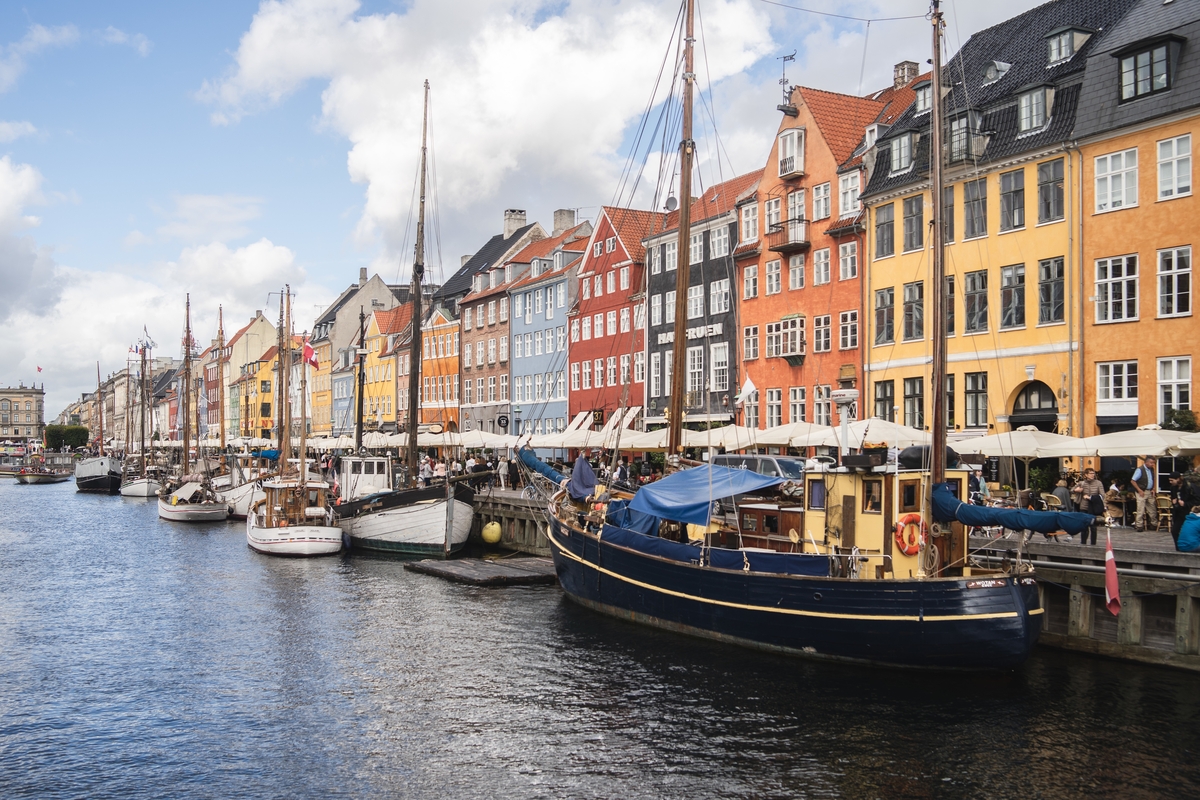
Innovation and Technology Integration: Copenhagen’s smart city initiatives revolve around the seamless integration of technology into everyday life. It boasts an extensive bike-sharing system and smart traffic management that prioritizes cycling lanes, reducing congestion and promoting eco-friendly commuting. The city’s commitment to smart energy grids and renewable energy sources showcases its dedication to technological advancement for a sustainable future.
Sustainability: At the heart of Copenhagen’s ethos lies sustainability. The city’s ambitious goals include becoming carbon-neutral by 2025. Initiatives such as the Copenhagen Climate Plan focus on renewable energy, green spaces, and efficient waste management, fostering a city that leads by example in sustainable practices.
Quality of Life Improvements: Copenhagen’s smart initiatives have substantially enhanced its residents’ quality of life. With an emphasis on clean air and accessible green spaces, the city promotes well-being. Smart urban planning ensures easy access to amenities, efficient public transport, and a high standard of living, contributing to a thriving and content population.
Future Outlook: Looking forward, Copenhagen remains dedicated to innovation and sustainability. Plans include further investment in smart infrastructure, leveraging data analytics for optimized city planning, and expanding renewable energy initiatives. Moreover, the city aims to continue fostering a culture of citizen engagement and collaboration to shape its future developments.
Copenhagen stands as a testament to what a sustainable smart city can achieve. Its holistic approach to technology, sustainability, and citizen well-being positions it as a model for cities worldwide, offering a blueprint for a harmonious urban future that prioritizes both technological innovation and environmental stewardship.
3. Barcelona
Nestled along the Mediterranean coast, Barcelona stands as a beacon of innovation, seamlessly blending its rich cultural heritage with cutting-edge technology to pioneer smart city solutions.
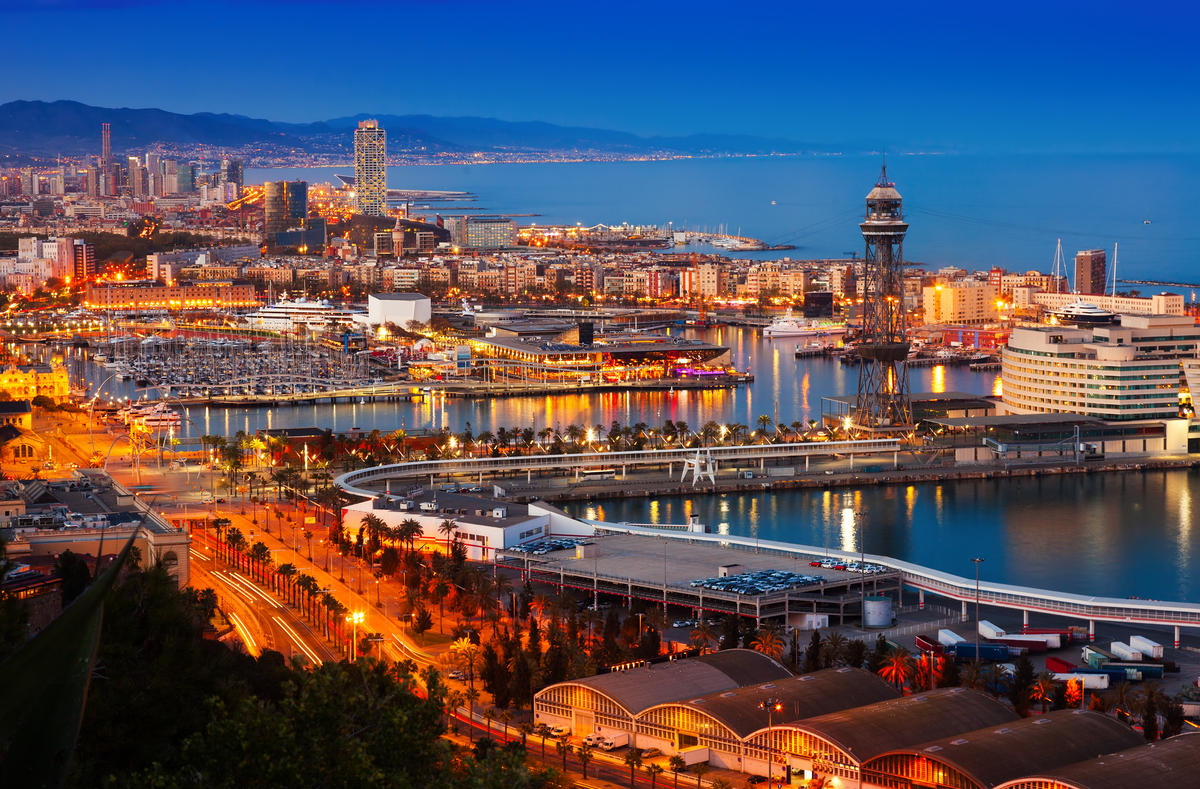
Innovation and Technology Integration: Barcelona’s identity as a smart city is defined by its extensive integration of technology. The city has implemented groundbreaking initiatives such as smart parking systems, adaptive street lighting, and an extensive network of sensors. Its commitment to the Internet of Things (IoT) is evident through the use of data analytics for efficient city management.
Sustainability: At the forefront of Barcelona’s smart initiatives lies sustainability. The city embraces eco-friendly transportation solutions, including electric buses and bike-sharing programs, reducing carbon emissions. Furthermore, Barcelona’s focus on sustainable urban development and green spaces fosters a healthier environment for its residents.
Quality of Life Improvements: Barcelona’s smart city initiatives significantly enhance the daily lives of its inhabitants. From improved public transportation and efficient waste management to the provision of free public Wi-Fi through city-wide networks, the city prioritizes convenience and accessibility, elevating the quality of life for residents and visitors alike.
Future Outlook: Looking ahead, Barcelona continues to innovate. The city aims to further leverage technology to enhance urban mobility, emphasizing smart solutions for traffic management and public transportation. Initiatives fostering digital inclusion and citizen engagement remain pivotal in shaping Barcelona’s future as a leading smart city.
Barcelona’s fusion of historic charm with cutting-edge technology paints a portrait of a city that cherishes its past while propelling itself into the future. Its commitment to innovation, sustainability, and citizen-centric initiatives cements its status as a global exemplar in smart urban living.
4. Singapore
Singapore, a vibrant city-state, stands as a paragon of innovation, consistently pushing the boundaries of technology to redefine the standards of a smart city.
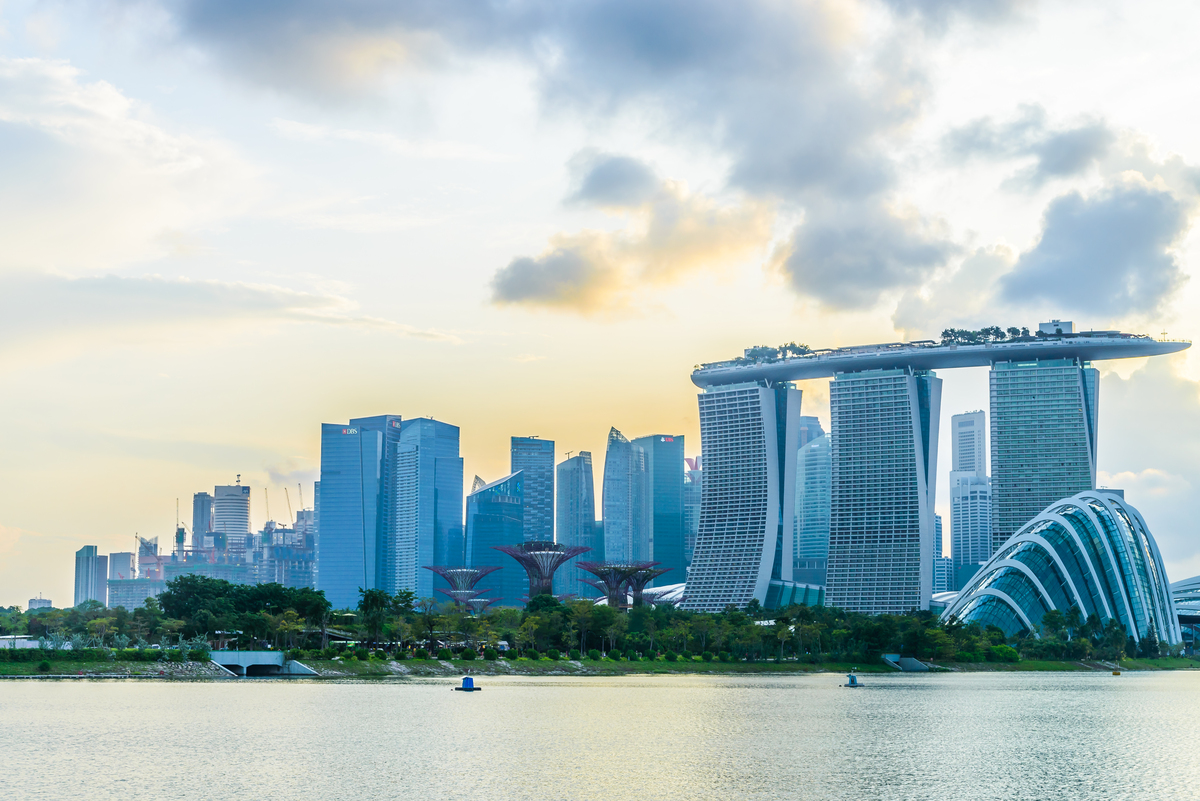
Innovation and Technology Integration: At the heart of Singapore’s smart city status lies its seamless integration of technology. The city boasts an extensive network of sensors and data analytics, optimizing various facets of urban life. Initiatives like the Smart Nation initiative and the use of advanced AI in urban planning showcase Singapore’s commitment to technological advancement.
Sustainability: Singapore’s smart initiatives prioritize sustainability. Despite limited space, the city has implemented vertical gardens, green buildings, and water recycling systems. Additionally, its focus on clean energy and smart grid technology reflects a dedication to environmental stewardship.
Quality of Life Improvements: The smart initiatives in Singapore have revolutionized the quality of life for its citizens. The city’s efficient public transportation, smart traffic management, and seamless digital services contribute to a highly convenient and accessible urban environment.
Future Outlook: Looking forward, Singapore remains at the forefront of innovation. The city continues to invest in emerging technologies, emphasizing advancements in areas like cybersecurity, artificial intelligence, and further integration of IoT. The goal is to continuously enhance city services and maintain Singapore’s position as a global leader in smart urban development.
Singapore’s relentless pursuit of technological excellence and sustainability positions it as an unparalleled model for smart cities in the world. Its ability to seamlessly integrate technology into urban life while prioritizing sustainability and citizen well-being underscores its status as an epitome of modern urban innovation.
5. Amsterdam
Nestled in the heart of the Netherlands, Amsterdam exemplifies a city that effortlessly marries its rich historical roots with cutting-edge technological advancements to foster a smart and sustainable urban environment.
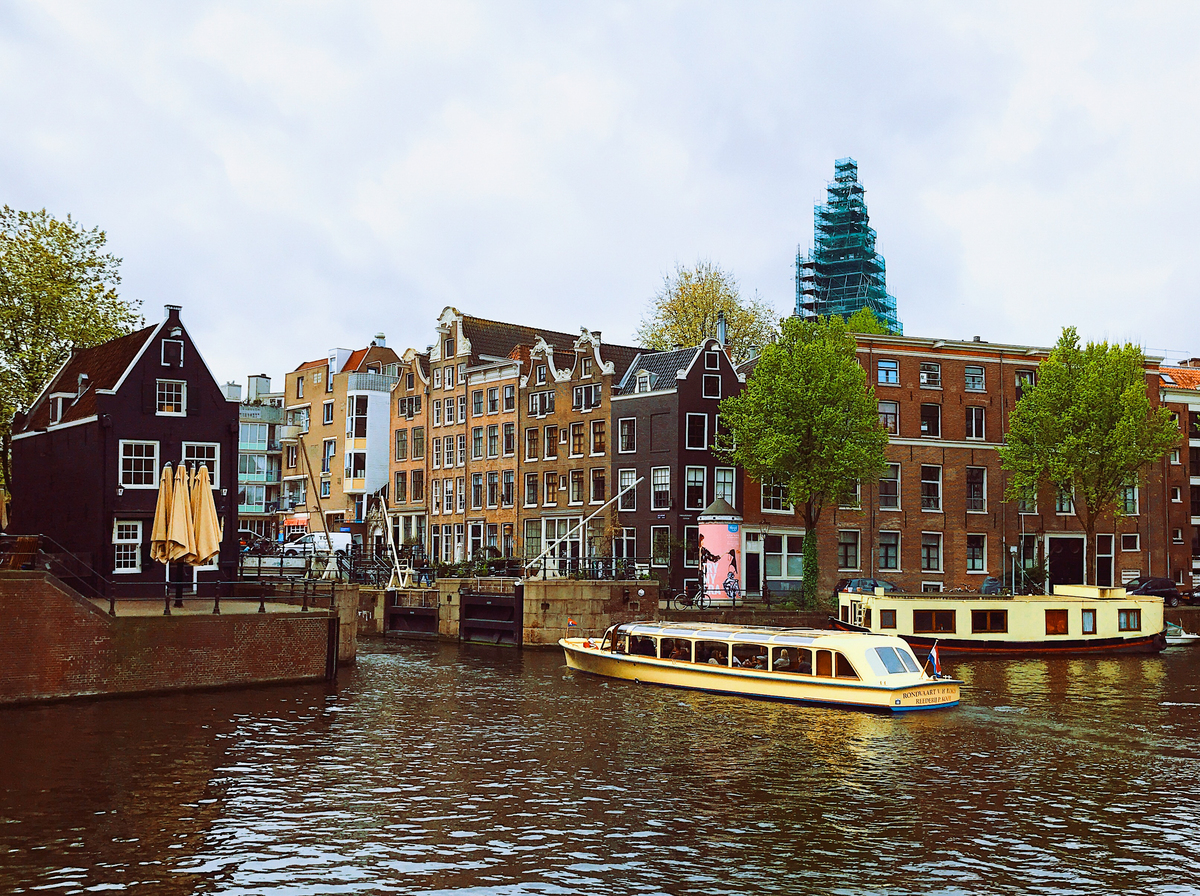
Innovation and Technology Integration: Amsterdam’s smart city initiatives revolve around the seamless integration of technology into its urban fabric. The city harnesses IoT devices and data analytics to optimize transportation systems, enhance energy efficiency, and promote smart urban planning. Projects like the Amsterdam Smart City program highlight its commitment to leveraging technology for the benefit of its citizens.
Sustainability: At its core, Amsterdam is dedicated to sustainability. The city’s emphasis on renewable energy, eco-friendly transportation, and circular economy principles is evident in initiatives like the use of electric vehicles and the promotion of green rooftops, fostering a greener and more sustainable urban landscape.
Quality of Life Improvements: Amsterdam’s smart initiatives significantly elevate the quality of life for its residents. The city’s efficient public transportation networks, cyclist-friendly infrastructure, and initiatives promoting citizen engagement contribute to a more accessible, connected, and livable city.
Future Outlook: Looking ahead, Amsterdam continues to be a pioneer in urban innovation. The city aims to further integrate technology to improve mobility solutions, foster sustainable energy practices, and enhance digital connectivity. The focus remains on creating a city that not only embraces technological advancements but also prioritizes the well-being of its citizens.
Amsterdam’s harmonious blend of historic charm and forward-thinking initiatives exemplifies a city that values innovation, sustainability, and citizen-centric development. Its commitment to leveraging technology for the betterment of urban living sets a remarkable standard for smart cities in the world.
6. Paris
Paris, the City of Lights, embodies an innovative spirit that converges history with forward-looking smart city initiatives, aiming to redefine urban living on a global scale.

Innovation and Technology Integration: At the forefront of Paris’s smart city status is its robust integration of technology. The city has embraced innovative solutions, including IoT-powered infrastructure, data-driven governance, and smart energy systems. Initiatives like the “Reinventing Paris” project showcase its commitment to technology in urban regeneration and sustainable architecture.
Sustainability: Paris prioritizes sustainability in its smart city initiatives. With a focus on reducing carbon emissions, the city has implemented ambitious projects like expanding green spaces, promoting electric transportation, and retrofitting buildings for energy efficiency. Initiatives like the Paris Climate Plan highlight its dedication to combating climate change.
Quality of Life Improvements: Paris’s smart initiatives have significantly improved the quality of life for its inhabitants. Efficient public transportation, such as the bike-sharing system and extensive metro network, alongside digital platforms for citizen engagement, contribute to a more connected and accessible city.
Future Outlook: Looking ahead, Paris remains committed to innovation. The city aims to further invest in green initiatives, expand digital infrastructure, and foster innovation hubs to promote entrepreneurship and technology. The goal is to create a city that continues to embrace technology while preserving its cultural heritage and enhancing the well-being of its residents.
Paris stands as a beacon of modernity and sustainability, intertwining historical charm with cutting-edge technology to shape the future of urban living. Its commitment to innovation, sustainability, and citizen-centric initiatives cements its position as a global leader in the realm of smart cities.
7. London
London, a city steeped in history and tradition, stands as a testament to modern urban innovation, seamlessly integrating technology to propel itself into the future.
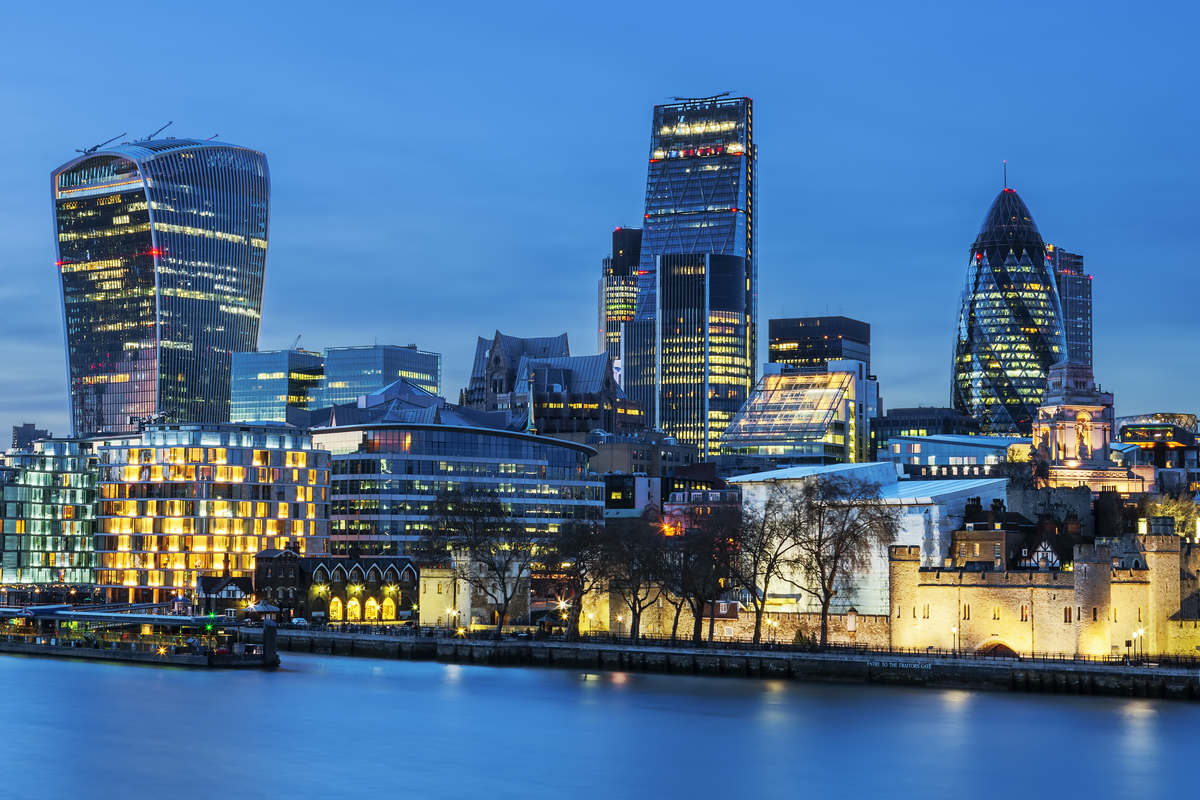
Innovation and Technology Integration: At the core of London’s smart city initiatives lies a robust integration of technology. The city leverages IoT, data analytics, and AI to optimize transportation systems, enhance public services, and drive efficient governance. Initiatives such as the Smart London Plan demonstrate its commitment to technological advancement for the betterment of city life.
Sustainability: London places a strong emphasis on sustainability in its smart city endeavors. Projects focused on reducing carbon emissions, promoting green spaces, and implementing eco-friendly transportation options highlight its commitment to a greener, more sustainable urban landscape.
Quality of Life Improvements: London’s smart initiatives have significantly improved the daily lives of its residents. Efforts in inefficient public transportation, digital services for citizen engagement, and advancements in healthcare and education contribute to a more accessible, connected, and livable city.
Future Outlook: Looking ahead, London remains dedicated to innovation and growth. The city plans to further integrate technology into urban planning, expand digital infrastructure, and prioritize initiatives aimed at reducing environmental impact. London’s focus remains on creating a city that continues to evolve while enhancing the well-being and opportunities of its diverse population.
London’s harmonious blend of tradition and technology positions it as a global leader in smart urban development. Its commitment to innovation, sustainability, and citizen-centric initiatives paves the way for a brighter, more connected future in the realm of smart cities.
8. Oslo
Nestled amidst picturesque landscapes, Oslo stands out as a trailblazer in smart city initiatives, harmonizing technology with a profound commitment to sustainability.

Innovation and Technology Integration: Oslo’s smart city journey is anchored in the seamless integration of technology. The city harnesses data analytics, IoT, and innovative solutions to optimize transportation, manage energy resources efficiently, and enhance governance. Initiatives such as the FutureBuilt project showcase Oslo’s dedication to pioneering sustainable and smart urban development.
Sustainability: At its core, Oslo is dedicated to sustainability. The city’s commitment to carbon neutrality by 2030 is evident in initiatives like renewable energy adoption, electric mobility, and eco-friendly urban planning. Projects such as the development of green spaces and pedestrian-friendly zones underscore its efforts toward a greener, more livable city.
Quality of Life Improvements: Oslo’s smart initiatives have significantly elevated the quality of life for its residents. The city’s efficient public transportation networks, focus on clean air, and digital services for citizen engagement contribute to a more accessible, healthier, and prosperous urban environment.
Future Outlook: Looking ahead, Oslo continues to prioritize innovation. The city plans to further invest in sustainable infrastructure, expand digital connectivity, and promote initiatives fostering eco-friendly practices. Oslo’s vision revolves around creating a city that seamlessly integrates technology while prioritizing sustainability and citizen well-being.
Oslo’s commitment to blending sustainability with technological innovation positions it as a global benchmark for smart cities. Its holistic approach, focusing on environmental consciousness and technological advancement, sets a remarkable standard for urban development, promising a future that is both smart and sustainable.
9. Zurich
Zurich, nestled in the heart of Switzerland, emerges as a paradigm of smart city evolution, seamlessly weaving together precision technology and a deep-rooted commitment to sustainability.

Innovation and Technology Integration: Zurich’s smart city initiatives pivot around meticulous technology integration. The city leverages data analytics, IoT, and precision engineering to optimize transportation networks, manage resources efficiently, and enhance governance. Initiatives like the Smart City Zurich project underscore the city’s dedication to pioneering advanced solutions for urban challenges.
Sustainability: At its core, Zurich is dedicated to sustainability. The city’s focus on sustainability is visible in its extensive use of renewable energy, efficient waste management systems, and emphasis on green spaces. Initiatives like the promotion of energy-efficient buildings and eco-friendly mobility options highlight Zurich’s commitment to environmental stewardship.
Quality of Life Improvements: Zurich’s smart initiatives have significantly elevated the quality of life for its inhabitants. With a highly efficient public transportation system, emphasis on clean air, and digital platforms for citizen engagement, the city fosters a more accessible, vibrant, and inclusive urban environment.
Future Outlook: Looking ahead, Zurich remains dedicated to innovation. The city plans to further invest in sustainable infrastructure, expand digital connectivity, and encourage initiatives promoting green practices. Zurich envisions a future where technology seamlessly harmonizes with sustainability, fostering a city that prioritizes the well-being of its residents while embracing innovation.
Zurich’s intricate blend of precision technology and sustainable practices positions it as a global exemplar in smart urban development. Its commitment to marrying technological innovation with environmental consciousness serves as an inspiring model for cities worldwide, promising a future that is both technologically advanced and environmentally sustainable.
10. Hongkong
Hong Kong, a bustling metropolis on China’s southern coast, stands as a beacon of urban innovation, intertwining advanced technology with unparalleled connectivity.

Innovation and Technology Integration: Hong Kong’s smart city initiatives revolve around seamless technology integration. The city embraces IoT, data analytics, and digital infrastructure to optimize transportation systems, enhance public services, and promote efficient governance. Initiatives like the Smart City Blueprint for Hong Kong highlight its commitment to leveraging technology for urban development.
Sustainability: While space is at a premium, Hong Kong focuses on sustainability. Initiatives like energy-efficient buildings, waste management, and eco-friendly transportation options showcase the city’s dedication to reducing its environmental footprint. Efforts toward green architecture and expanding green spaces underscore Hong Kong’s commitment to sustainability.
Quality of Life Improvements: Hong Kong’s smart initiatives significantly elevate the quality of life for its residents. With a highly efficient public transportation network, digital innovation in governance, and initiatives promoting connectivity, the city fosters a more accessible, connected, and efficient urban environment.
Future Outlook: Looking ahead, Hong Kong remains committed to innovation. The city plans to further invest in smart infrastructure, expand digital connectivity, and promote initiatives for sustainable living. Hong Kong envisions a future that seamlessly integrates technology while prioritizing sustainability and connectivity for its diverse population.
Hong Kong’s dedication to blending innovation with connectivity positions it as a global leader in smart urban development. Its commitment to technological advancements, sustainability, and connectivity serves as a model for cities worldwide, promising a future that is both technologically advanced and people-centric.
11. Dubai
Dubai, a visionary city in the United Arab Emirates, stands as a testament to ambitious urban development, characterized by its embrace of futuristic technology and innovative infrastructure.

Innovation and Technology Integration: At the heart of Dubai’s smart city initiatives lies an embrace of cutting-edge technology. The city leverages IoT, artificial intelligence, and data-driven solutions to optimize transportation, enhance public services, and revolutionize governance. Initiatives like the Dubai Smart City Strategy underscore the city’s commitment to becoming a global leader in technological innovation.
Sustainability: Dubai’s vision encompasses sustainability amid rapid development. The city’s emphasis on renewable energy, eco-friendly architecture, and initiatives like the Dubai Clean Energy Strategy illustrates its commitment to reducing its environmental impact. Efforts in sustainable construction and waste management showcase Dubai’s ambition for a greener future.
Quality of Life Improvements: Dubai’s smart initiatives significantly enhance the quality of life for its residents and visitors. With a focus on efficient transportation systems, digital services for citizen engagement, and iconic architectural marvels, Dubai fosters a dynamic, cosmopolitan, and future-ready urban environment.
Future Outlook: Looking ahead, Dubai remains at the forefront of innovation. The city plans to further invest in smart infrastructure, expand digital connectivity, and promote sustainability initiatives. Dubai envisions a future that seamlessly integrates advanced technology, sustainability, and luxurious living for its diverse and thriving population.
Dubai’s bold embrace of futuristic technology and unwavering commitment to innovation positions it as a global frontrunner in smart urban development. Its dedication to technological advancements, sustainability, and the creation of an unparalleled urban experience makes it a beacon for cities aiming to redefine the future of urban living.
Challenges and Lessons Learned in the Evolution of Smart Cities
The evolution of smart cities, while promising unparalleled advancements in urban living, hasn’t been devoid of challenges. These challenges have not only tested the resilience of these cities but have also offered invaluable lessons in their quest for technological transformation.
1. Infrastructure Integration
One of the primary challenges encountered in building smart cities in the world has been the integration of diverse infrastructural elements. Combining technology with existing infrastructure while ensuring seamless interoperability remains a complex task. However, smart cities have learned the critical lesson of phased integration—implementing solutions gradually and in manageable segments, ensuring compatibility and minimal disruption.
2. Data Privacy and Security
The reliance on vast amounts of data for decision-making has raised concerns about privacy and security. Ensuring the protection of citizens’ data while leveraging it for city development has been a delicate balancing act. Smart cities have learned that robust encryption, data anonymization, and transparent data usage policies are essential. They’re increasingly involving citizens in data governance processes, fostering trust and accountability.
3. Funding and Sustainability
Sustainable funding for smart initiatives has been a persistent challenge. The investment required for technology adoption, infrastructure development, and maintenance is substantial. However, smart cities are learning to leverage public-private partnerships, grants, and innovative financing models. They’ve realized the importance of demonstrating the long-term economic and environmental benefits to secure sustained funding.
4. Citizen Engagement and Inclusivity
Engaging citizens in the smart city transformation has proven challenging. Not all citizens have equal access to technology or feel adequately represented in decision-making processes. Smart cities have learned that inclusivity is key. They’re focusing on digital literacy programs, and accessible platforms, and involving diverse communities to ensure that smart initiatives address the needs of all residents.
5. Regulatory and Policy Frameworks
Navigating complex regulatory environments and outdated policies has hindered the swift implementation of smart solutions. However, smart cities have learned to collaborate with regulatory bodies, advocating for agile policies that accommodate technological advancements. They’ve realized the importance of creating frameworks that encourage innovation while ensuring ethical and responsible use of technology.
Lessons Learned:
These challenges have served as catalysts for crucial lessons in the evolution of smart cities:
Adaptability and Flexibility: Smart cities in the world have learned to be adaptable and flexible in their approach. They understand that agility is key in a rapidly changing technological landscape.
Collaboration and Partnerships: Collaboration among stakeholders—government, private sector, academia, and citizens—has been paramount. Smart cities in the world have learned that effective partnerships foster innovation and sustainability.
Iterative Progress: They’ve embraced the concept of iterative progress, understanding that continuous improvement and learning from failures are fundamental to success.
The journey of smart cities in the world has been marked by challenges that have tested their resolve. However, these challenges have been instrumental in shaping resilient, inclusive, and innovative cities. By learning from these challenges, smart cities are paving the way for a more connected, sustainable, and equitable urban future.
Conclusion
As cities worldwide strive toward smarter, more sustainable futures, the concept of a smart city has emerged as a transformative force in urban development. A smart city represents an amalgamation of technological innovation, data-driven strategies, and a commitment to sustainability, aimed at enhancing citizens’ lives and shaping a more efficient, connected, and environmentally conscious urban landscape.
Key elements define the essence of a smart city. Technology integration across various sectors, from transportation to healthcare, underpins these cities’ functionality. The ability to harness data for informed decision-making, predicting needs, and improving services remains pivotal. Sustainability serves as a cornerstone, driving initiatives to reduce environmental impact through energy-efficient practices, smart infrastructure, and green spaces.
Central to the concept is the promise of improved infrastructure and quality of life. Smart cities invest in modern amenities, efficient transportation systems, and digital platforms, fostering vibrant communities and facilitating easier access to essential services. Citizen engagement lies at the heart of these initiatives, promoting interaction, feedback, and participation through digital mediums.
The collaborative spirit fuels innovation within smart cities in the world. Partnerships among government bodies, businesses, academic institutions, and technology experts drive cutting-edge solutions to urban challenges, ensuring cities evolve in response to citizens’ needs.
Smart cities continue to learn and grow from these challenges, demonstrating resilience and innovation. By embracing these lessons, they pave the way for a more connected, sustainable, and equitable urban future. As cities evolve, the journey toward smarter, more inclusive urban landscapes remains a testament to human innovation and the collective vision for a better tomorrow.
Suggested article for reading:
Top 10 Smart City Projects
9 Smart Building Examples; 2024 Reviews
Smart Building Solutions in 2024: A Comprehensive Guide
Resources:
Earth.Org | Smart Cities World | Sustainability Magazine | Digi International | Sustainable Review | IoT World Today | imd.org
For all the pictures: Freepik





